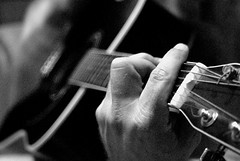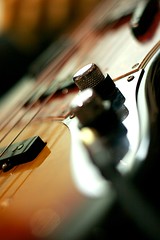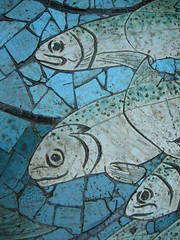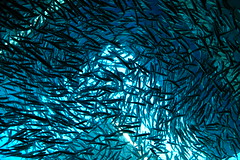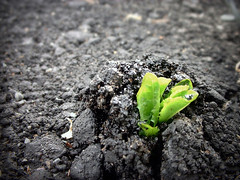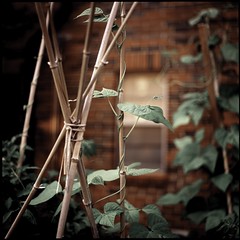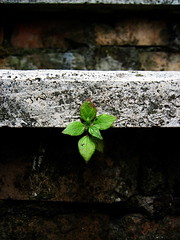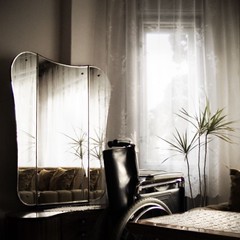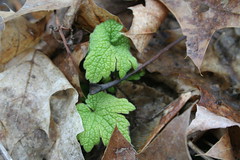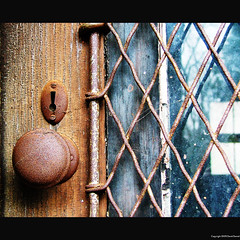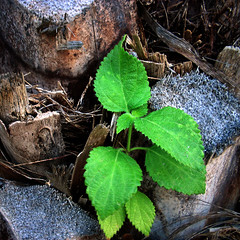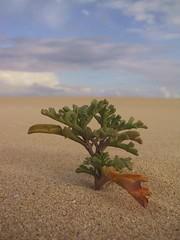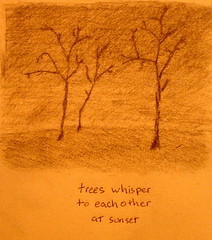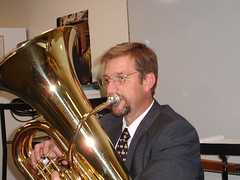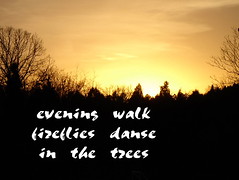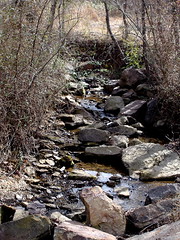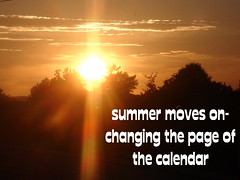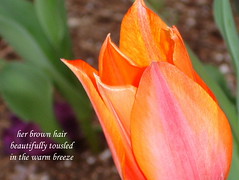|
~Tony Brown In Musical Recital~
 Tony Brown, a poet who was unknown to me until following the 2008 Poet Laureate Of The Blogosphere and to my surprise not only he won but he got above three hundred votes. Then it was his voice reciting with tune of music, that had left know doubt whatsoever that such votes are well deserved. This interview will be insufficient without hearing Tony Brown voice recital. LIP has an honor to take with a journey of our 2008 Poet Laureate of the Blogosphere
95 North (Coming Home)
strain your eyes
hard enough
and you will learn what is perfect
dampen them with fatigue
and it will be easy to make
diamonds from the night's coal
the facets will glint through tears
and halos will form around
headlights
the world becomes more precious
as you become
more tired of it
the moments that will stand out in the dark
will stand out precisely because
you have come so far
and still have far to go
Did you expect that you will be getting such votes and nomination? And wining such title in the world of blogging, has it created more impact on your writing and had it opened new doors of opportunity?
First off, thank you for your kind words and attention!
It’s still a little unreal to me that I won this award. I confess that I put out the word to my various subscribers and friends to vote for me, but I didn’t expect such an overwhelming response. I treated the “campaign” for the title as a bit of joke, honestly, using various campaign slogans and statements as an extended satirical commentary on the current US election campaign. Now that I’ve won, of course, it seems that the joke was on me to some extent…
Seriously, I’ve already seen an uptick in the people visiting my blog (radioactiveart.livejournal.com) and commenting from as far away as Malta! So it’s been a really nice validation of the visibility such a contest and title can provide. And I’m honored to be in the company of such excellent poets who were nominated and the past winners.
Your were described as " Tony is a Worcester area poet who has been a vital part of the poetry scene both at home and nationally for over a dozen years. He’s a self-professed original punk, and his poem" has poetry always been running in your veins or you have discovered poetry at certain time of your life?
Oh, I am someone who’s always known he was a poet, from an early age. I still have notebooks faithfully documenting my poetry back to age 14, in 1974. It was and is the defining characteristic of my life. I don’t know who I’d be if I hadn’t discovered and been encouraged to pursue poetry at an early age. Fortunately, I don’t have to find out.
Far from poetry, who is Tony Brown, and how he pursues his life ?
Currently, I’m a self-employed human resources and training consultant – I stepped out on my own from a 25 year corporate career a few years ago to create a lifestyle that allowed me more time to pursue my art. I also make a fair amount of my living from poetry performances and freelance writing.
I’m a lifelong resident of the Worcester, MA area, a longtime member of the US performance poetry and slam scene, and a passionate but mediocre guitarist who knows enough to stick to poetry on stage.
Faro and I met just a couple of years ago. He worked for my girlfriend at one point and she thought I should check out his music online. I was immediately intrigued with the possibility of working with him. We’re very different – I’m 48 and he’s 20, but he’s an astonishing and inventive bass player and guitarist. I’d worked with musicians before and had never quite clicked with the whole music and poetry thing, but the two of us have developed a style and process for working together both in the studio and on stage that truly makes our work as Duende a collaboration in the largest sense of the word.
Oh, and the punk thing? I was and am a devotee of punk rock – not just the music, but the entire esthetic of the early days of that artistic sensibility. That “do it yourself” initiative continues to inform my work, even though you rarely see me at a punk show nowadays.
Faro is more of a jazz/funk/rock player, as well as a sensitive classical guitarist, so even though our music doesn’t sound much like punk, I like to think it’s still informed by that direct, in-your-face ethic.
Sometime talent can be such a blessing. How poetry and music showered your life.
I think of poetry as my religious practice – my way of taking with and to God and the world about my questions regarding existence. It’s the central place of my being. Music isn’t far behind in terms of importance. I see them both as forms of communication, ways to communicate things that are frequently well-nigh impossible to speak to any other way.
I don’t know what else to say about that.
If you had not had your poetry where do you see your self ?
Wow. No idea. I might have pursued being a musician more intensely, but honestly, it’s beyond my comprehension how to separate my identity from my poetry.
Which poem you feel through the years is your favorite or you would never forget.
Easy one. “DIY” (which stands for the punk motto “do it yourself” as a manifesto for taking the control of your life and art into your own hands) is pretty much a poem about my deepest desires for myself and the world. I have those three letters tattooed on my chest above my heart as a constant reminder of that.
Here’s the poem:
DIY
She burns sage at the root of her favorite tree
and calls herself priest while in town they call her slut and worse
because she dares to love who and what and when she wants.
On the nights of the full moon the men and the women of this town
come out and circle her stucco walls.
There is something in there they need.
And out there, in front of the white church, on the green lawn, right under the nose
of the fat pastor, she dances without bending a blade of grass.
God finds her agreeable.
Over there, in front of the frat house, two men kiss --
and the dangerous drunken boys inside see it
and decide to do nothing -- this time.
That's a start. Two have begun
to be comfortable making public
their own sacrament of the infinite.
And my grandmother sniffs,
" ' Elderly' is such a spindly word.
The legs of that word do not begin to support me."
She traded her electric typewriter for a laptop
two years ago and writes the definitive poetry of our age
between the innings of Cubs' games.
She will not stop smoking. Ever.
Swears that if she gets to heaven to find the clouds are posted,
she'll find another place to light up.
Friends, the arms of God are nearly endless --
but there you hang out at the end of one of them,
like a finger on a vast hand.
All that's asked of you is that you touch the earth
and transmit what you feel
back to the Heart.
So -- make a living.
Make a life. Make love. Make art.
Adorn this world with the work of your soul. But --
Do it yourself. No one
can do it
for you.
What inspires you to write and is all your poetry tide in music?
I write a fair amount of poetry that is not designed to be performed with music, although Faro can pretty much set music to anything. If anything is true about that, it’s that I think of poetry as an art of creating musical language in and of itself, so a lot of the time the solo voice is enough.
I guess the answer to that question, then, is that yes, everything is tied to music, even if it’s just the rhythm of ordinary speech or more “exalted” language, if I can use that word.
As for what inspires me – everything. Love, hate, the cat in the window, social injustice, internal dialogue, interpersonal connection, a good guitar’s perfect voice – anything!
How far would you like to go with your poetry?
Also an easy one. I’d like for at least one poem of mine to be remembered decades after I’m gone, even if no one recalls who wrote it.
How did you begin to write a column in poetry website? (Tell us more about it)
I write a column for the Gopoetry website (http://www.gotpoetry.com) called “Zero Point Zero” and have been writing it off and on for several years now. It used to be a weekly column but I’ve cut back significantly over the last two years because of time constraints.
John Powers, who runs the site, is an old friend of mine from the area, and we’ve both been involved in the poetry world for many years now. He originally asked me if I’d do a column with a pretty wide open mandate – talk about issues in poetry, especially in the world of performance poetry and the slam world.
The column is named after the lowest possible score you can get in a poetry slam. I used it as a metaphor for the starting point of every poem.
The topics range from explorations of my own philosophy and process for writing and performance and the politics of poetry and its place in the world, to discussions of forms of poetry and their particular characteristics, along with occasional rants about bad poetry – pretty much runs the gamut. A kind of snapshot of my thinking about the various aspects of the art form on any given day. Hard to categorize. I’m in the process of turning the existing columns into a book manuscript, which is hard – it ranges all over the map and figuring out a natural flow hasn’t been easy.
Really, it’s just an extension of all my work – a way of communicating to my fellow poets and lovers of poetry about what we do and who we are. It’s a labor of love, even when it seems to be a chore.
In fact, I guess that’s a pretty good summary of why I am a poet. A labor of love.
The journey of Tony Brown does not end in this interview, read his poetry but moreover hear him reciting with music on http://www.myspace.com/poetrybytonybrown . His poetry and thoughts are here to be sought after and you can find it on http://radioactiveart.livejournal.com/
(Photo of Tony Photo by David Huang, from Flickr.com photo of Bass by luzylle and th Guitar by philputnam) Labels: Faro, LPoet aureate Of the Blogosphere, Nasra Al Adawi, Punk, Slam, Stephen Cafaro, Tony Brown, Worcester
Anna Piutti ~Poetry Without Borders ~
 Anna Piutti Anna Piutti
~Poetry Without Borders ~
 A poet has no borders. Will stand in any destination then with his or her poetic voice, it will be a starting point creating a new home. A poet is not necessarily a binding to poet herself or himself in his mother tongue, poetry reaches you in any language, for when poetry calls, it can call you in many languages not bound with your own language. Anna Piutti may be among a number of poetic faces whom their inspiration sparked through a foreign Language. Anna can be found in a blog titled Red As Wake
http://annapiuttipoetry.blogspot.com/
The flight to Italy carries me with anticipation, for LIP is a first journey but this trip had to be taken meeting Anna in her homeland. Italy can only be described through an eye of an Italian: "I find my country fascinating. I am literally surrounded by history, amazing architecture, and art. As times passes, I like to see how ultra modern buildings and Roman, or fifteenth century buildings co-exist. Some people are upset at the sight of advertising posters/boards on ancient buildings in historical cities such as Venice. Time won’t stop. It’s inevitable; it’s just history taking its course”." Anna draws for us an image of modern Italy.
She continues sketching a deep picture of where poetry stands in Italy " Poetry has always been a very important part of Italian literature. Many Italian poets are well-known and widely studied worldwide. Just think of Dante Alighieri and his Divine Comedy, or how the Petrarchan sonnet form was imported from Italy by the English Sir Thomas Wyatt and Henry Howard, the Earl of Surrey in the sixteenth century. Aside from that, Italy is still forging very talented poets who mostly write in Italian, but whose work can easily cross geographical borders thanks to the internet, and to international poetry magazines. Gradiva - International Journal of Italian Poetry, is one of them."  One of the hardest part when one finds a flower and to answer our inquisition, we often feel the need to find its true seeds, petals needs to be plucked one after another. My journey was short, time was not allowing me to pluck the petals. So I faced Anna with a question about where can she be found: " As a so-called commuter student, I can easily be found aboard trains and city buses in the early mornings and evenings. The remaining part of my day is usually spent taking classes, and/or studying in University halls. When I’m on a break I enjoy spending quiet time at home, and meeting up with the people I love." With ease explaining who is the person behind the poetry. My thoughts still lingered with other question for how poetry added the person she is " I can’t tell for sure whether writing has added to who I am, or whether it has simply been one of the many ways of expressing who I already am." She stated in firmness. So I conjured her with another question as to why she chose English as medium of her poetic voice "I’ve always found the English language deeply fascinating. Its vocabulary, sounds, and the word games which can easily spring from it have made it particularly suitable for the kind of poetry I write. I often think and dream in English, and the thoughts which lead me to start working on a poem come to me directly in English. I don’t have any first drafts in Italian. I haven’t written any poems in my native language yet, but I might in the future." Gasp How could one not crave the kind of truth that makes trust skip a beat and fall amidst wisteria storms when the rageful season swarms and sneers, shamelessly infesting the senses? Copyright © 2006, Anna Piutti Anna finds herself woven with her poetry, a bonding that can not be detached, its Oneness: " There is no detachment between my poetry and I. You will find me in my verses, regardless of what each single poem focuses on. I find inspiration in the world around me, in the way it resounds inside me. I am often inspired by vivid dreams I have. As a matter of fact, I worked with specific oneiric material in three of my poems (“Oneiric 1, 2, and 3”)", Anna explains… Oneiric 1 (The Moon Lantern) Its paper skin, so tense and fragile, holds the sublime power of unnatural paleness. The cold light from its miniature heart whispers ultrasound lullabies. Round, it hangs from a shelf, in still loneliness. A moon lantern in the dark: nothing but a half-sleep snapshot in vivid haziness, a subliminal message from dormant realities. A smooth and ghastly sphere, it reigns through inexpressive eyes. It smiles a red crayon line, in paralyzed reassurance. At once, it cradles me in incense-flavored eeriness. It's inanimate flattery through my permeable brain; and it keeps me enslaved, voiceless, and void-bound. It's a countdown to innocence as time rewinds its tape; and a purple wave envelops me... And I don't mind. Copyright © 2005 Anna Piutti  Anna's poetry trails smoothly in my journey and I welcome her words. The recital falls as gentle as drizzles when it begins to fall. No doubt poetic words delivers a calming effect for the one who writes and the one who receives and listens to the words with attention. " I began to write poetry when I was in my teens, in 1998. I was going through a lot of inner struggle. On a November afternoon, at my aunt’s house, I timidly typed a couple of lines at her computer. I felt relieved. That’s basically how it all started." She emphasis the effect of poetry. . When we least think of Poetry it knocks on our doors and at times when we call it to fill the inner void, it seems it had traveled out of our reach. Anna explains about poetry visits quite eloquently " I often suffer from the infamous “writer’s block”, which can last for months. It is quite frustrating. When new verses finally scream from within, and inebriate my every sense, it feels like an inner explosion. It is powerful, and relieving. It often happens when and where I least expect it. I once found myself scribbling words and fragments of verses on the back of a bus ticket I had in my pocket, being it the only piece of paper available to me at that very moment."
Anna admires the work of other poets, yet in the process of writing her own poems, it’s a relation of between her and poetry. Here she explains why: "I highly admire many poets, but to tell you the truth, I can’t think of a poem I wish I had written. What has been written is such an intimate part of each single author, that even though I can often empathize with verses I read, I could not possibly wish they belonged to me. Also, I deliberately avoid reading too much poetry (If I can, I’ll read none at all) while I’m writing, because I’d rather not imitate anyone." Breakfast High above the roofs, the frost-lacquered crane branch holds a plump, radiant orange. Hungry for warmth, I grasp the vital sphere and slice it into thick wedges. A paper towel on my lap, I sink my teeth into the morning’s glow: calm, juicy. Sweetly sour. Copyright © 2005 Anna Piutti Unfolding Anna's pages of Poetry, what poetry stores for her, " I guess I’ll keep exploring life as it filters through me. However, I don’t have a specific place I wish to reach when it comes to writing. I never plan a poem in advance, nor do I write “on command”. If I were asked to write a poem as an assignment, I doubt the result would be satisfactory." You have explored her different corners within her poetic walls, now take a visit to her blogspot Red As Wake All Photos posted in this interview is the copyright of Anna Piutti..
Floots........Fluting image and words
 Floots Floots
~Fluting image and words ~
I decided to take the opportunity to interview Floots, who I know through his blog , i-land-i-site ( http://i-land-i-site.blogspot.com/ ). Though I'm his regular visitor and fan, I had it in mind that it would be an easy to go through his poetry and photos and guide my journey through the interview and, therefore, I was surprised when I found there was no archive on his blogspot. However, that challenge did not stop me going forward with the interview for LIP.
Floots is based in United Kingdom, the land where you feel the country side flavor. No wonder his poetic inspiration does not only tie us on poetic words, our eyes also are fulfilled not only with poetic imagery where words paint explicit images in our mind; with Floots there is an added treat to words: photographs, a treat for our eyes and soul. Each poem of his connects words and image, the two arts woven together in an inseparable union.
Let us start our interview, just getting a bit far from image and poetry?
"Floots?" We know you under this pen name. What is the meaning behind it?
There is a Scottish expression - “Hoots mon” - often used in a jocular way to show surprise or disbelief and, when I was planning to move to Skye, many of my friends would say it to me. Then, because of my love of wind instruments, the term became “floots mon” and, finally, when searching for a nom de plume, Floots. It began as a foolish joke but seems to have stuck.
Who is Floots without poetry and photography?
I was a secondary school English Language and Literature teacher (pupils aged 11 – 18) for over twenty years but had to retire early when I developed a problem with my vocal chords. Though this was obviously bad news in many ways, it has meant that I can now lead a simple life in beautiful rural surroundings. I very occasionally do a little part-time work but generally I spend my time reading, playing music, writing, sawing firewood and, of course exploring.
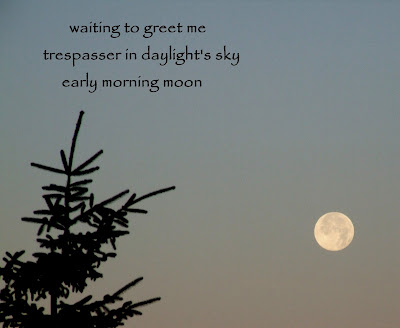
Your inspiration seems to be intertwined with nature. Is this a reflection of where you live? Do you believe an artist is a reflection of his environment and surrounding?
Certainly landscape and wildlife play an important role in my life and my writing. I love them for themselves and so some of my writing is simply a matter of observation but, of course, the Natural world is also a rich source of inspiration and metaphor. I think that we all draw on our surroundings and, as I grow older, the cartography of my past seems increasingly rich in ideas. I think that retrospection is unavoidable on a personal level but, it is also a universal phenomenon, and I would hope that it engenders empathy rather than seeming self-centred.
Tell us more about your land (Isle of Skye)? DO you still live there?
Skye is a large island off the northwest coast of Scotland. It is approximately fifty miles long but has a total population of only ten to twelve thousand and almost a quarter of the people live in the one main town. Until 1995 the island could only be reached by ferry but then a bridge was built, enabling much easier access. There was a great deal of ill-feeling over the high toll charge but this has now been scrapped and free travel between the island and mainland Scotland is simple. It is a beautiful place with its mix of mountains, glens and lochs and a variety of wildlife.
 not so much a poem not so much a poem
more
a walker’s guide to absent friends
at the end of the walk
settled back in the car
all i could hear was the silence
i’d not done it before
down across the open glen
and
up into the lower slopes of the mountains
all the while hugging the banks of the stream
pausing
periodically
to gaze at waterfalls
and
rock pools
(alas no naked nymphs)
at one point i had to cross a mini-torrent
on
semi-submerged stepping stones
it was like playing leapfrog with analogies
then up the slope
loose stones and sheep shit
(damn - musta got one of those analogies stuck to my boot)
i reached the point where my map said the return path cut left
too bad the landslide hadn’t read the pamphlet
when there’s nowhere to go
go on
so I did
into a vast gulch between the mountains
water glistening on the wrinkled rock-faces
courtesy of october sun
i sat awhile
became a part of it
then
turned for home
skipstumbling back down the slope
towards
a distant peanut butter sandwich
once
settled back in the car
all i could hear was the silence
for two hours
that stream had talked to me
made music from rocks and air
given itself to the day
had i stopped listening
or
taken it into my heart
that mountain stream flows on
and on
and on
but
like
the whisper of a lover
it’s
loudest
when it’s gone
……………………………………………………..
The word affair, it is often not linked with poetry. However, poetry is a passion that takes a large part of ones emotion? Would you agree with the term The Poetry Affair ? Certainly I have had a long love affair with poetry. My mother read poetry to me from a very early age and I am sure that her love of metre, rhyme and narrative has stayed with me. Even as a very old lady, the slightest “cue” in a conversation would set her off, reciting some snippet from a favourite poem. I am eternally in her debt for this (and so much more) and sense that poetry will remain my constant lover and confidante.
When did you realize your passion for poetry? Did you nurture this passion within you?
As I said above, I have loved poetry since childhood. I began with the simple rhythms of nursery rhymes and moved on though the variety of poetry enjoyed by children. Nonsense verse and narrative verse were always particular favourites. I think that writing poetry followed naturally and, as my father used to write poems and illustrate them with sketches, albeit his style was different to that of my own adult writings, he was undoubtedly a valuable early example.
What does the word Poet means to you?
To me a poet is anyone who looks inside themselves, and at the world around them, and tries to share their discoveries through the medium of words. Words such as “style” and “quality” are largely subjective when dealing with the written word and should never be allowed to detract from a poet’s self-image. In John Barth’s novel The Sot Weed Factor, the hero describes himself as “poet and gentleman” and I would be happy to work towards that for myself.
Many of us enjoy poetry but have never had the courage to explore it. Can poetry be taught in ways which help the person to become a poet at some stage of his or her life?
Simply sharing words with others will always be the mainstay of poetic communication but I do believe that some of the basic “joy” of poetry can be taught. Certainly, as a teacher, I was always attempting to do this. Links between poetry and song are a great help and there is no question in my mind that the memorability of poems can be a great help for younger readers/writers. I think that a knowledge of the terminology of poetry can prove useful but, as in many artistic fields, I think that it is a case of learning the rules before breaking them. Writing-by-numbers - simply adding adjectives, figures of speech etc will never be a substitute for a writer’s real emotions.
Do you have favorite place which inspires you and helps you to write?
I have too many to count. The Isle of Skye provides enormous inspiration but I also have so many memories of particular beaches and stretches of moorland which have special meaning for me. I can remember one place in England which I could never drive past without thinking of an old friend. She had never been there but this place, the run-off from an old mill, a haven of shadows, willow and still water, always brought her to mind. Where I live now, the jagged silhouette of The Cuillin Hills (Skye’s mountain range) never fails to thrill me and set me thinking.
Which is your priority: photography or poetry? Or are they equally important?
Words are my first love. Their meaning, sound, variety and rhythm are at the heart of what I do, but I enjoy photography and it will often provide the starting point for a poem though, if we are being wholly accurate, I suppose that this could often be seen as an extension of my love of the Natural world which we have already discussed. I enjoy experimenting with forms such as haiga and taiga where the text is incorporated in the image but I also like to think that with much of my work the words could stand alone. Having said that, I think that when words and picture work well together that is a bonus.
Does a photograph always prove to be the starting point for a poem or is the pattern sometimes reversed?
There is no hard and fast rule. Sometimes a long walk will provide me with a series of photographs, some of which will be crying out for words. On other occasions I will write a poem and only later start to think of possible illustrations.
Where do you want to head with your talent? Do you believe every talent, whether photography or poetry, has a peak or is it limitless?
Really all I wish to do is continue writing. My publishing successes have been few and far between and as I grow older my ambition fades. I am human enough to admit that I would love to be “discovered” by some publishing genie but, in reality, I have little time for such thoughts and very rarely submit poems other than by invitation. I would rather be writing than waiting for rejection slips. This does not mean that I disapprove of such ambition in others - in fact I find it admirable in many cases - simply that I am happy in my laziness and with what I produce. I do not think that artistic talent has a peak in any real sense. There may be times when “best” works are produced but, once again, that is largely subjective. The last, tired musings of a dying man may not seem relevant to the angst-filled forward-looking youngster (and vice versa) but time will always prove that there is common ground. I am always looking forward to the poems which I have yet to write.
What inspires you to write? In the process of writing, do you find yourself?
Dependent on my mood, almost anything can inspire me. I have written on just about everything from death to marshmallows and would stand by the validity of them all. It is the poem which matters. Form and content should be a blend. It is not enough to choose a “serious” topic or adhere to some clearly defined form: there needs to be harmony. I’m not sure that I have found myself - but I intend to keep looking.
Can you define the style of writing which you prefer to write in and which other poetic style you would like to explore further?
I would say that I prefer free verse and certainly, in my earlier days I tended to avoid rhyme. However, as already mentioned, I don’t think that there should be rules. I now find it irritating when people say that they “never” read/write one form or another. Life is too short and varied to make time for absolutes. I always found it sad, when asking students to write, that “does it have to rhyme” was the perennial question. “What do I want to say?” is the important point. Sometimes the rhythmic fluidity of a sonnet may be the perfect choice for expressing oneself but at other times a chunk of rambling free verse, written in colloquial language, will do the job best. The same can be said of all forms. For example, Narrative verse is not superior to haiku: the two forms have their functions and should both be lauded. I would never wish to tie myself to any one form and hope that I never tire of trying new ones, happily making and breaking rules as I go.
What have you gained from having a blog for your work? Do you also have another website where you present your work? Please mention the site where we can find you creativity?
I enjoy writing for the blog. It provides a gentle spur, if such an oxymoron makes sense, keeping me diligent, while giving me the knowledge that a few people will read my words. I also like the thought of those friendly virtual faces writing for me - letting me share their dreams.
I do not have another website. I do not keep an archive on the blog but, periodically, I will re-post poems; either because I particularly like them or because I am short of inspiration. Sometimes, when browsing my own records, I will find a poem which I have forgotten writing: another good reason for a re-post.
Each creativity or art takes the person who pursues it on a journey and at times it becomes a process of give and take. What has your creativity given back to you and would you recommend that we pursue our creativity?
Creativity is all. The joy of producing something is an end in itself, whether we have built a drystone wall or a poem. I get as much pleasure from letting the wind steal notes from my tin whistle as I sit on a hilltop as I do from writing and both activities are vital ways of expressing myself. Emotions and thoughts build up inside us and need to be explored through whatever medium suits us best. Whether we share it with a huge audience or a silent piece of paper, whether it is stylistically perfect or hesitant and stumbling does not matter. What matters is that we have an inner voice - and listen to it.
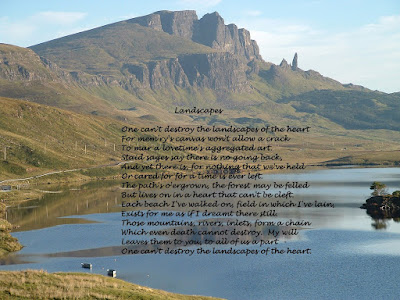
Landscapes
One can’t destroy the landscapes of the heart
For mem’ry’s canvas won’t allow a crack
To mar a lovetime’s aggregated art.
Staid sages say there is no going back,
And yet there is, for nothing that we’ve held
Or cared for for a time is ever left.
The path’s o’ergrown, the forest may be felled
But lives on in a heart that can’t be cleft.
Each beach I’ve walked on, field in which I’ve lain,
Exists for me as if I dreamt there still.
Those mountains, rivers, inlets form a chain
Which even death cannot destroy. My will
Leaves them to you, to all of us a part -
One can’t destroy the landscapes of the heart.
 As we reach the shore, ending is always hard. You can dive more in to Floots words and images in his blog http://i-land-i-site.blogspot.com/ As we reach the shore, ending is always hard. You can dive more in to Floots words and images in his blog http://i-land-i-site.blogspot.com/
All poems and images are copyright of Floots ....
Mystic Rose "Petals of Her Poetry"
 She is a Mystic Rose, each petal is poetry that LIP could not resist but wanting to peel to find her depth yet not to discard the petals. So the only way is to sink within her soul and here just bits of her poetic petals:How did you become a voice of mystic rose?
 I chose the name based on a experience I had in my meditation when I was in my teens. I had just started on the spiritual path that I am now currently on .. since then the rose has been my favorite flower and fragrance. One evening I was meditating and I felt this profound closeness to my guru, and this fragrance of rose filled the air around me. Over the days it got deeper and whenever I would try to follow it with my attention it would recede, but when I gave up and just meditated, it would come back and one day it was so strong and I realised that it was coming from my heart..every time I would breathe out, it seemed to rise within me and fill my senses, there was a certain 'coolness' about it, like a slight breeze. Since then the rose has been my favorite flower and equated with spirituality. Also in Sufism, the divine is referred to as a Rose, symbolically. I chose the name based on a experience I had in my meditation when I was in my teens. I had just started on the spiritual path that I am now currently on .. since then the rose has been my favorite flower and fragrance. One evening I was meditating and I felt this profound closeness to my guru, and this fragrance of rose filled the air around me. Over the days it got deeper and whenever I would try to follow it with my attention it would recede, but when I gave up and just meditated, it would come back and one day it was so strong and I realised that it was coming from my heart..every time I would breathe out, it seemed to rise within me and fill my senses, there was a certain 'coolness' about it, like a slight breeze. Since then the rose has been my favorite flower and equated with spirituality. Also in Sufism, the divine is referred to as a Rose, symbolically.
Actually I must say that when I say mystic rose, I am not referring to myself though that has now become a pseudonym. I am referring to the divine.. and the blog was to be my expression of seeking it. SO is the address. - light of rose - meaning the divine. But unfortunately it turned around and i became mystic rose.. In retrospect I should have termed it Seeking the Rose perhaps!!  Why did you choose to write under pen name?As I said, I chose the name with the clear intent being "this is what I seek".. but I did not use my name to sign my posts, perhaps because this 'i' is insignificant.. and also, it afforded me anonymity and I could write something personal in a way that I would not otherwise have done. Why did you choose to write under pen name?As I said, I chose the name with the clear intent being "this is what I seek".. but I did not use my name to sign my posts, perhaps because this 'i' is insignificant.. and also, it afforded me anonymity and I could write something personal in a way that I would not otherwise have done.  Your poetic voice has so much femininity, lavished with ample romance? How do you define your poetry? Your poetic style has it been influenced with certain poet and certain poetry style (can you tell us more about it)Its difficult to define myself even to myself, and no I don't have any particular style that I know of. I use a lot of visual images in my writing, and try to catch the ephemeral, the magic in the ordinary. I've never studied poetry, prose is my preferred medium actually. Its only lately that I have come to read here and there. I like Rumi and Wordsworth. And lately blogger friends have been introducing me to a variety of poets. I so enjoy that! To read their favorite poems and see how much I like them myself. If anyone has influenced me it is probably Rumi and Khalil Gibran. I wish I could read Rumi in Persian. Your poetic voice has so much femininity, lavished with ample romance? How do you define your poetry? Your poetic style has it been influenced with certain poet and certain poetry style (can you tell us more about it)Its difficult to define myself even to myself, and no I don't have any particular style that I know of. I use a lot of visual images in my writing, and try to catch the ephemeral, the magic in the ordinary. I've never studied poetry, prose is my preferred medium actually. Its only lately that I have come to read here and there. I like Rumi and Wordsworth. And lately blogger friends have been introducing me to a variety of poets. I so enjoy that! To read their favorite poems and see how much I like them myself. If anyone has influenced me it is probably Rumi and Khalil Gibran. I wish I could read Rumi in Persian.
I prefer poems by mystics, saints. And as for romance and femininity, I am a woman of course! and romance is a part of life to me. But it isn't a conscious effort on my part to be feminine or romantic in my writing. Mystic Rose, where would like to go and reach with your poetic voice???When i first started writing it was with a hunger to share what I felt within. I would like to be able to reach my friends, other women, well anyone and everyone who would be open to being reached actually . I would like to be able to soothe people, draw them into the magic of those moments that I have experienced. I wish I could make people connect to that inner thing, the beauty that is within them that allows them to experience everything in that beauty.. That is why i use a lot of visual images, if a person will allow herself to be drawn into those images, I feel like my work is done. But most often I end up feeling inadequate with my words.  Your love for music is so apparent, do you find there is a line where music and poetry blend? Your love for music is so apparent, do you find there is a line where music and poetry blend?
I think music is very profound, it is such a pure expression of our creativity. Music is fluid in structure, it flows like a river, widening and narrowing, transforming our moods and it leads us to a kind of awareness of our souls. Music IS poetry in pure sound, and at their highest both are born of the deepest wellsprings of human feelings, and that is why they have the ability to reach into us even hundreds of years later.
I listen to all kinds of music and choose from a variety depending on my mood, and generally use it to balance me. In your own words, what makes a poet or a writer a serious writer or poet? In your own words, what makes a poet or a writer a serious writer or poet? Anyone who writes, looks forward to writing every day, cant do without it, knows how much it means to them. Studies, not just reads, the masters. Writes, pours their heart and soul into it.
I understand you are based in India, how is the scene of poetry in India? (India had couple of Authors who are best sellers, does poetry have share in this?)Poetry has always been a part of Indian culture, the ancient texts are poems thousands of lines long and they can be sung. In fact poetry in India is very rich, the language used is itself highly musical and rhythmic in sound. Poetry was made popular by bhakti movement.. the devotional spiritual movement.
Rabindranath Tagore won the Nobel Prize for his book of poems, Gitanjali. There are and were wonderful poets but probably not well known outside of India because their medium is not English.
some of the other well known poets are Vikram Seth, Jayanta Mahapatra, Eunice de Souza, there's quite a few actually.. and sad to say I haven't read them yet.
Which one of your poems that lingers with you and it’s a poem you would not forget?Something I had written in my late teens. One of the very first ones I wrote shortly after I had that experience during my meditation. Just before I started on this path and met my guru, my life was going through a turmoil. I have never before published that poem on my blog. Here it is:
My life was like a parched land
Thirsting for your touch
I knew not what I had lost
But I knew despair
Waiting for the beauty,
the innocence and the joy of life
The cracks went deep
My heart was dry
And then-
And then you came
A shower of gentle rain
I eagerly quenched my thirst
and yearned for more
Sometimes a misty presence
cool and teasing
sometimes stormy
with thunder and lightning
Beautiful and awesome
From the parched land
This flower has risen
From the fresh smell of the earth
It's fragrance comes
My Mother,
you have touched this flower and
shaped its petals
your fingers have played on it
bless me-
that I may now lie at Your FeetHow does the seed of poetry begin for you, where do you get your inspiration???Most, not all, of my poems are spiritual in nature, my quest, experiences, some of them are inspired by nature, some perhaps by everyday life experiences, from meeting other people. So, just from life, I guess. 
~DAWN ~
Through those depths of vast emptiness
the earth whirling in star sprinkled sleep
the asleep consciousness in a land of illusions
Far off the first miracle streaking the edges of heaven
drawing lover's fingers through fields of black
the first pale light grazing the prostrate terrain
The deep blush of your cheeks stained the skies
the Sun rose, a brilliant red God on your vast forehead
The ambrosial breath in the kiss of your lips
A spiritual vision, illumining the dark corners of matter
sacred moments of ardent unveiling fill the soul
and kindle the mystic fire of idealism.
Early beginnings of a new day,
the awakening to the morning's glow
sun kissed world, of rosy hues
and dissipating mists of moonlight.
Have you ever published a book or are thinking to be published? DO you think being a published poet can be determine our success of being renowned poets?
Of course, I think only the best are published, so if ever I were to be published I think I would be ecstatic, but, no I am not looking for my poetry to be published.
Where can we find your writing and poetry?On my blogs.. http://lightofrose.blogspot.com/For those of us who would like to engross our soul in to writing, could you advice us to where to begin?
Find your style, start with the books that you most like to read..poetry or prose. study the masters. Read and write with all your heart and soul, explore, introspect, observe. Since i just started myself, I cannot really give more advice than that. :)
Mystic Rose, you left us speechless with your photo poetry. As I end here, your poetry sets out of my ears but I look forward to hear your words reciting within as like the sun when its set away from our eyes, we await for the sunlight again...
~Paul in Salmon Song ~
Salmon Song
Singing, singing, throw a life into the sea
Like salmon flinging, ringing out the changes,
Strong charges of their swimming, leaping destinies
Running home to spawn and die. I too
Fling, sing, dive down, hurl forth again
Gladly in Thy name;
Unfurl my length, uncurl coiled strength without reserve
To move more sleekly, sing more sweetly,
Better serve; help stir the waters running through this earth
Help move, help birth, a world.
Swim strong, to God return, give all:
It is a cleaving song that calls,
And life that in the losing lives.
by Paul Martin
© 2007 Lynne Ann Martin
LIP brings out poetic writers whether their poetic writing is in form of poetry, haiku, prose. To LIP it’s that poetic serenity that furnish layers of poetry in whatever kind of form.  Paul in his new website www.originalfaith.com but to me, I have known him in his blog titled by "Spiritual Dialogue". His blog was among the first blogs that I started reading. His blog puts a poetic touch in understanding the unity in a religious as he puts in his own word "I would like the focus to be at least as much on noticing what unites us as what divides us." as stated by Paul. If you have been given a chance to introduce Paul, explaining to other who is Paul? What would you say about Paul? (In another way can you tell us more about you, the person beyond your writing)?Thank you, Nasra, for beginning with something central to my point of view. I’d like to pick up on that right away – the fact that my primary interest is in what unites people spiritually.
The word "God," which I use in the poem above, can itself be a source of disunity. People can mean different things by it. The primary association for many people is belief in the existence of a supernatural entity which, of course, atheists don’t believe in at all.
I view people as being spiritual by nature. My book Original Faith: Becoming Our Truer Nature focuses on experience instead of doctrine. I’m careful not to use words like God – or for that matter “spiritual” – without first grounding them in language that evokes experiences that we share as human beings, then defining and conceptualizing them strictly on that basis.
This approach is compatible with having religious beliefs – or not. And it’s this experience-based approach to spiritual life and development that at times gives my writing literary qualities. That’s the kind of writing that helps to evoke and refer readers to similar experiences they’ve had for themselves.
As to the person beyond the writing, in a way that person doesn’t exist. I’ve written about what matters most in life as far as I can tell. As words have come to me over the years, I’ve tried my best to live by them in my life as a whole.
My work life consisted of a twenty three year career working with elementary school children, first as an English as a Second Language teacher and then as a school counselor. My private life was spent getting up very early to jog or meditate followed by writing for a few hours before heading out for work. On weekends I often had some time to spend among a small circle of friends and relatives.
Paul you have concentrated on religion studies and all what is related to it but from time to time, you seem to color the discussion with petals of your poetry. What does poetry means to you? Where you pick your inspiration? (is it nature mostly)
Poetry was a surprise following a surprise. My prose work on what would become the manuscript for Original Faith began as notes I took for my own use until I noticed they were falling into categories that might make for a book. Then, a few years into writing regularly, I came in from jogging one morning and “had” a poem! I’ve never written one on purpose. Nature has been the greatest source of inspiration. As long as I was already up so early I used to jog just after dawn – a beautiful time to be up. Your blog have examined different aspects of religion? Where poetry and religion fall? Are they are any intertwined between the two?
My blog does look at different aspects of religious thought. A bit randomly! Most of my posts aren’t very much like the book, though I do plan to change this – I plan to post excerpts as it gets closer to the book becoming available. Many of my current posts come from a less impassioned, more analytical point of view. I just find that easier to do in the short format needed for blog posts. However, to break this up, I occasionally post essays and poems.
Spirituality and religion often find expression in poetry. In my own writing, poetry and prose both focus on this area. My poetry relates more to immediate experience. Original Faith adds meaning to immediate experience by going a little way toward conceptualizing it; offering some insights; considering relationships between, for example, love and faith. But I go only “a little way” with conceptualization because it’s easy to go too far. It’s easy to end up playing games with language and logic. So my thoughts about experience don’t stray far from experience itself.
If I say poetry is writing and writing is poetry? Do I agree with definition and what is your point of view of it? Some prose does possess poetic qualities like sharp imagery or musical use of language. So when it comes to writing, I’d tend to see poetry, good fiction, and nonfiction that has a large element of creativity, as having a lot in common.
"Accidents and disease-onsets happen everyday – to the good, the bad, the ugly, and the beautiful. And old age that becomes advanced enough brings anyone pain, loss of mobility, physical fragility – the sorts of things that some of us are brought face-to-face with in earlier years." This is quoted by you as you have been tying voice up strength to someone who had gone through this road. We understand it has not been easy for you as facing rare illness and your battle to overcome all the hurdle is on going road for you? Would it be possible to open up to us and to tell us a bit of your illness? How you find the strength to go beyond obstacles. How do pluck a flame of hope in the mid of hardship?
The specifics of my condition are very unusual. Over a decade of extensive research and medical travel produced no diagnosis, not even at leading facilities like NIH and Johns Hopkins. My case is so unusual that it’s hard to give a brief description that people can quickly relate to or understand.
In a way it compares (but maybe not so favorably!) to advanced old age. Physically I’m very fragile because peripheral nerves, muscle, connective tissue, and bone are all pervasively affected. I’m extraordinarily limited in the physical positions I can assume and have been unable to leave the house by any means for well over two years. I’m in widespread, intractable pain.
None of this started until June of 1994, when I was thirty seven years old, which was long after I’d found my basic direction in life. While the adjustment from good health to progressive disability and pain took many years to come to terms with, it was never a challenge to the outlook that had developed during my physically healthy years.
How have I found the strength? It’s been a process. While my condition has diminished and actually ended my life in many aspects, in a way it’s still been one single process that in my case happened to begin with ease and joy, then proceed into struggle and pain. To try to briefly suggest/summarize:
We don’t own our lives. We’re called to fully own up to what we only borrow for a while. To begin owning up to this is to find ourselves more and more identified with far more than any self alone can ever be. Becoming enlightened, finding our Buddha nature, developing “Christ consciousness,” becoming more human or humane… I think these are all different terms for one thing. Different traditions have different terms and that’s very much OK once we begin to really learn what we are saying.
We can experience this transformation of our identity through joy. Joy takes us out of ourselves, opening us up to a greater world. Terrible or terribly sustained adversity can also take us out of ourselves. Either we eventually allow it to part us from our unhappy reactions over things not going our way; or these reactions, on top of our misfortunes, can overwhelm us.
No one enters the world with a guarantee of health, happiness, success, or safety. Rather than say "Why me?" it is far more constructive and realistic to ask "Why not me?"
The Way and the Strife
It’s possible to go nowhere.
Or we can find a path and take a way.
If we are fortunate, it is a way of joy. Joy is movement. Joy takes us out of ourselves.
If we are less fortunate, it is a way of pain. Yet adversity that is great or sustained enough can also have potential to take us out of ourselves after the kicking and screaming are over.
But I think it is the same basic path either way - and for every one who takes it.
© 2005 by Paul Martin
There is saying in my part of the world "God does not take everything from you", do you believe facing the turmoil of illness there other tributes you have gained? Prehaps you have gained perspective in living? The major change has been the uncovering of strength far beyond anything I could have imagined when I was healthy. My condition requires me to live without joys, comforts, and sources of inspiration that I once couldn’t have imagined doing without.
A Forest Place
The woods are lovely, dark and deep
A poet from my home state said
And sowed another thought to reap:
That woods are lovely, dark and deep
As women who men dream of in their sleep
And when they waken ever seek to find;
The kind with thoughtful, mild and pensive brows
A shady place of winsome, ever-beckoning ways
Like dappled forest paths that fade and wait
Recede among the farthest trees
Enchant with all that lies so deep…
With hair more fragrant
Subtle-sweet
Even than the sudden scent of pine;
And arms wind-soft
To clasp, encircle men as gently as the air, but visibly –
More beautiful bower of graceful curves than these brown trees.
…and eyes like starlight-gleams
That shine between the highest branches in the dark
And mark a wider sweep of things
An endless arc
From which a fathomless compassion springs.
A woman is a tender earth
A sheltered home, a dark embrace;
A woman is a holy ground
A woman is a forest place.
By Paul Martin
© 2005 Lynne Ann Martin
They say God test us as he puts in peek of hardship, where writing and poetry falls in this pit of falls?I think it depends on the kind and degree of hardship and where the person happens to be with their life and in their writing when it occurs. Sometimes hardship is a catalyst for creativity but if it’s severe or prolonged enough it can thwart creativity.
“I consider myself profoundly as well as superficially Christian. In the sense that I am profoundly Christian, I am also profoundly Jewish, Muslim, Buddhist, Hindu, and human.”
Paul Martin, 3/27/05 www.spiritualdiablog.blogspot.com
You choose to blog about a very sensitive matter about religion what the lessons that you have gained and experience from running such dialogue?
It may be that it’s so sensitive because we so often focus on our differences. I think we’d do well to emphasize the things we have in common – matters that we can experience and know first hand. What love is, what faith is, the chief obstacle in everyone’s path – these are a few of the things I discuss in Original Faith.
As to that “superficial/profound” contrast, I was referring to my perception that all of us participate in certain profound truths that our various traditions strive to articulate. I would say that my primary religious identification is that I am a person. My particular heritage, a relatively superficial matter, happens to be Christian. When I happen to make use of language or imagery from the Christian tradition, I use it for its power of great hearted inclusiveness, not for parochialism and exclusivity.
Help Build
A human being, whatever special mix of gifts
He owns, wherever placed by circumstance
Can find a way that is the way of He who calls
And balanced so upon the narrow walk gains strength
Can strike the cleanest, hardest, telling blow yet never falls.
O he can strike
From stone draw light
Can flake a spark
That works in love.
Come, act;
Come act in love.
Come move, come strike
O wield the hammer that is yours to wield
This world is womb of God: serve, deliver him,
Help build his world
Help build a kingdom suited to a King,
Help make, increase, the godliness of things;
Through work of yours let music of his call resound
Down other centuries, through more millennia of sun-rounds
To rounder, sounder, sweeter worlds than this;
Help build a World
Help wield a brush across the deep
Help hammer, chisel features in a wall of stone
Hear in the dark how nature stirs and moans
Grows more humane
Throws off another cloud of sleep:
This world once moved becomes a gentler place
Wears more and more the imaged look
Of a compassionate Father’s face.
O praise with works the One who calling comes;
O work while there is time to act with love.
By Paul Martin
© Lynne Ann Martin 2005
One of your views, you covered mediation. Do meditations help in the process of our writing?
I found meditation a wonderful method for helping with the process of my life. Its impact on my writing was large, but mostly indirect. However, there was one particular aspect of the book that came about as a direct result of meditation: I would have had less to say about love, faith, and their interrelationship if I hadn’t meditated.
Do you feel writing has bring sense of strength and completion to who you are? It was interesting to me to see how writing entered into the process of my life as a whole. Many insights occurred as a direct result of sitting down to write every morning. These insights in turn affected how I lived.
Experience Metaphor
We often approach the issue of meaning in life by looking for a reason to live, when real meaning resides in the experience of our love, its purpose, and the self-transcendent identity to which it calls us. A meaning to life is not some series of patches we apply to holes in a fragile raft of reasons by which we can somehow hope to float over the sheer mystery of being here to live and die. Meaning in life is learning how to swim and how water feels against the skin. It is feeling what it’s like to go with the flow and what it’s like to struggle against strong currents, tiring. It is knowing water as our own element: from out of which we were born, into which we can live, and into which we are to die wonderingly. Though we may not fully know the meaning of life, we may fully live it.
Original Faith: Becoming Our Truer Nature – from the introduction
By Paul Martin
© Lynne Ann Martin 2007
Where would you like to go with you writing? How far you wish to go on debates on the studies religion?
Original Faith was truly a labor of love and the work of my lifetime. It’s what I have to say as well as I can say it. I hope it can get into the hands of enough readers to maybe do a little good. I have two additional complete manuscripts and a third half finished, but these are secondary matters for me.
Paul you have established a dedicated readers for your blog. In the world of technology, fast moving, do you feel new generation tend to loose ways or connection with religion? I’d tend to see technology as spiritually and morally neutral, holding promise for doing good or harm depending on what uses we put it to.
Do you feel there is thirst for finding paths towards spirituality’? Religion and spirituality seem to be getting more media attention in recent years. Much of it is certainly genuine; some of it has the feeling to me of a fad.
~I Know~
I know there wouldn’t be much left of me if you subtracted things I’ve learned from fields and trees, the way wind plays and branches sway, and how great darkness brightens what little light it holds until it sparkles.
Original Faith: Becoming Our Truer – from Chapter Seven, Nature’s Work of Transformation, by Paul Martin
© Lynne Ann Martin 2007
You are currently working on publishing a book. Can you tell us more about it? How long did it take you to compile for publication?
The theme of Original Faith is identity transformation and its implications for how we live in the world. Chapters include love, faith, a sense of life’s greater promise, ego as an obstacle to going the way of faithful love, spiritual practice, works of daily life (moral action), and work.
Early chapters invite readers to enter into an identity-shift away from ego and toward love. The book then points readers toward further transformations of identity that may develop as we proceed further in this direction.
All told the book took about twenty five years to complete. In 1994 it was nearly done; however, that was the year my medical condition started. I ended up having to set the manuscript aside for most of the next decade because of the illness and everything surrounding it: extensive medical research and travel while continuing to work full time; battling my HMO for benefits; endless treatment regimens over a period of several years that accelerated the pace of my decline because I’d been misdiagnosed; and similar matters.
What are the challenges that you faced in publishing the book?
The main challenge for anyone trying to get a book published in the US today is what’s known as the “marketing platform” – name recognition or some other strong indicator that your book is likely to sell well. Publishing, like many other endeavors (including health care), has come to focus on maximizing financial gain to the point where concerns for quality of the work are often overridden. Publishers are rarely willing to take a chance on an unknown author, especially in the case of nonfiction and regardless of the author’s qualifications to write in his or her area. While some great books still get widely published, a lot of good stuff gets filtered out. And lots of mediocre stuff from well-platformed persons who may not even be writers ends up on bookstore shelves.
Where we can set an order for your new book? Information about the book is on www.originalfaith.com along with a contact form for anyone who’d like to be contacted once the book’s available several months from now. My site will be modified at that time and people will be able to order the book at Amazon.com or by going to my site which will link directly to the book’s Amazon page.
~Acknowledgments~
Today, a bright summer morning, I was lying on my living room floor enjoying looking up into the branches of a tall tree outside the window. Suddenly I had an insight relating to the book and put it on paper. Forty five minutes later, engrossed in writing, it struck me that it was probably my relationship with the tree that had made this insight possible. It wasn’t at all clear to me that I would have had it in the kitchen, bedroom, or at my writing table. In fact, I tend to doubt that I would have. Gazing up at the tree had somehow put me in a relaxed, gently searching frame of mind which had produced the result.
And later in the morning, this thought elaborated itself further to me while jogging and watching the hot disk of the sun glowing roundly from behind the mist: How often do we fail to notice all that is quietly there for us, supporting and allowing for the things we do? Had I ever acknowledged the sun? The sun that gave birth to all the heat and warmth we know and provided the clay of this earth from out of which the amazing complexities of our bodies and brains were created? I have done nothing by myself – ever.
By Paul Martin
© Lynne Ann Martin 2007
After book publishing – what is on your horizons for Paul? After Original Faith, I have two more completed manuscripts and a third that’s half finished. To me, Original Faith feels as much like my real job as my twenty three year career with children did – plus now I really can’t do much of anything away from the computer keyboard. So for both positive and negative reasons it looks as though this may be as far as my horizons extend.
Since LIP is a blog, just want to know did blogging have opened up opportunities for you? If yes, in what ways can blogging be a door of opportunities? I’m still trying to figure that one out! In my situation, my only means of reaching out to others is through use of the web. I can only hope that it will be effective.
LIP voice out to those who want to pursue writing of any form: Is follow you writing. What would your words be to us or advice for us?
Get a marketing platform. Otherwise getting your book read by more than family and friends will be tough. If I could still get around I’d have been willing to go back to school for my Ph.D. to try for teaching at the university level. Professors teach classes and give lectures; that’s a platform. Or I would have gotten creative and figured out a way to incorporate some form of regular public speaking into my existing career.
Paul, we here at LIP salute your willpower and thank you for allowing us to come up-close to you. Your life glimpses as a writer and as a person gives us inspiration to those who wish to taste the water of writing but beyond that it is how you turned around in the face of illness. As for me I look at it that illness can tremble our body down, can put our limbs into pain but it can not deter our spirit, for our spirit steers beyond the calamity. Once again Thank You.
Nasra, I’ve admired your work with charity and poetry for some time now – I was fortunate to have run across one of your blogs not long after I started blogging. Thank you for your invitation. You ask really good questions.
Reaching the end of this interview, Im sure you wonder what does the photos represent and why I have selected plants growing in rocks or in desert, to me in every plant you view in this article is how Paul spirit is ....The Spirit of hope grows even on Emptiness .... (The photos belongs to different photographer from flickr.com, their names are mentioned below the photos, if you enjoyed the photo click the image and leave them a comment)
~ Haiku Treat ~
Interviewed by Nasra Al AdawiProofread by Abs
warmth from the sun
held down against the ground
by the late night clouds
the moon and stars are seen
only with my eyes closed
J. Andrew Lockhart’s resolve for his poetic words comes through by using haiku. The Haiku is originally a poetry form which originated from Japan. Traditionally Haiku goes in to 5-7-5 syllables. I think if one gets into Haiku and uses an articulate sense of expressing the emotion through it, then this, to me, is the ultimate level of poetry, as it is not an easy way to express poetic thoughts just through three lines and able to pour emotion and images within the restriction of these lines. Andrew Lockhart had chosen the method of writing Haiku as his trump and here he shows us why he chose this hardest form of poetic writing. What is Haiku to you? Some of us are not aware of Tanka or Haiga. Can you explain a bit about them? Tanka, that were first called waka, began in Japan around the 9th century. They were written in five lines with 5-7-5-7-7 syllables. Their themes were personal and emotional, such as love, sadness or memories. Usually, the first three lines make a statement and the last two may go to another direction of the same theme.
In the 17th century, a new form of poetry grew from the tanka. This one, haiku, was made popular by the poet Basho (1644-94). Haiku are written in three lines in 5-7-5 syllables. Unlike tanka, haiku aren’t based on emotion, rather on a specific moment of time in nature. Haiga are haiku with a picture. Another form with the same structure is the senryu, which is usually humorous and isn’t necessarily based on nature.
How did you come around in expressing your self in Haiku? My knowledge of haiku was based only on elementary school exercises of counting syllables on three lines of 5-7-5. I found out, though, that to more keep the “feel” of Japanese poetry, the syllables weren’t strict at all. English, structured so differently than Japanese, can make a haiku too cumbersome when one has to add words and rearrange lines to fit a 5-7-5 rule. The modern method, though, looks for the least amount of syllables rather than a specific amount of syllables. Tankas are treated the same way.“ the classroom
at night
echoes with voices
of children
now grown
”
You are a music teacher and a poet. Of course to be a music teacher, you have to be musician yourself to be able to transfer the emotion of music to those you teach. Is there a linking point between the music that you teach and the poetry that you write? When you write the music tunes connect with your poetic instincts?
Poetry and music are both emotional, so I guess there is a connection. I rarely think of one while doing the other. There are exceptions, though, such as:
Chopin etude
at an art exhibition
as back ground-
cold fingers create
their own form of beauty
syncopation-
downspout rattling
in winter rain
Nature plays a big role in writing Haiku, where do you gain your inspiration in writing Haiku?
I would say that more than 90 percent of my work is written while I’m sitting outside, regardless of the weather. Nature is in front of me when I’m writing, so you can’t ignore it.
Who is J. Andrew Lockhart beyond Haiku?
I’ve lived most of my life in Van Buren, Arkansas (U.S.), which is a fairly small town next to the Arkansas River. I’ve been in many cities in many countries, but I’ve always felt that I belong here.
I attended the University of Arkansas from 1984 to 1991, receiving a Bachelor in Arts (music) and a Juris Doctor. In 1996, after practicing law for five years, I had a hemorrhagic stroke. That was followed by four years of rehabilitation, re-learning how to talk, walk, read and write. In 2001, I began as a Spanish teacher at an elementary school. The next year I started as the music teacher, as well. I’m still doing that and can’t imagine doing anything else.
Family is also a very important thing to me. We have four children – James (11), Katie (5), Hannah (2) and John (4 months). Needless to say, our house is never quiet.
Summer
“
In August, Summer demands our attention.
When the evening comes, she refuses to leave.
Being a visitor, she once again wears out her welcome.
By September, we are delirious, thinking that she'll never leave,
But then, she slams the door on her way out.
In October I'll miss her.
”
Do you think Haiku can just be simple poetry? Can the emotion and images be portrayed through Haiku as similar to poetry?
I definitely think that emotion and images can be shown in haiku and tanka – especially in tanka. When a writer is passionate about his work, emotion pours out of it, whether it is a tanka or a legal brief.
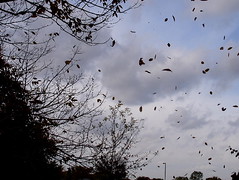
“
breeze-
spirits rise for more air
as leaves join
”
Do you find poets are facing many challenges with openness towards use of internet
The internet is a wonderful world of freedom for poetry. You can say what you want, whether it’s good or bad. In other words, your work is exposed to the entire world and you don’t have to go through waiting whether a submission is accepted. Also, you can spend hours reading poetry that you would never find in your library or a book store.
“
leaf hardened
from the sun-
wanting to go home
”
It seems recently you have also taken to photography ? Tell us more about this ?
* I don’t consider myself a “photographer,” but I have fallen in love with photography. The biggest reason for this is the digital camera. In the past, I never was interested in cameras, mainly due to the cost of developing them, not to mention the time I had to wait for them. I can now take a photo, put it on the computer and have it on the internet within minutes – for free. You can’t beat that!
My photo blog was started due to the amount of extra photos that I had when I was making some for haiga. It’s nice to have a place to put them.
Where can we find your poetry? Book and website... My main blog is Past Tense ( http://jamesalockhart.blogspot.com/ ). My photos are seen on Present Tense ( http://vanburendailyphoto.blogspot.com/ ). On Past Tense, there is a list of the other places where my work has been published.
It’s been mentioned that your published work is renowned? How did it all begin? Is there any criteria that we can use in writing Haiku. Of those of us who would like to ultimately publish our work what is your word of advice that can help us in that process? Please give us some tips that others can follow to be able to gain acceptance from poetry organizations? The best way to learn how to write a haiku or a tanka is to read what others have written. It’s important to be familiar with the history of the forms and to spend some time reading works from the past. It’s just as important, I think, to read works by contemporary poets. All of this is easily found on the internet.
There are many pleases on the internet where your poetry can be submitted. Whether it’s published, though, is up to the editors. When you spend some time reading works that have been published at a website, you get an idea of what they are looking for. I don’t write things just to be published, though. I look through works that I have done and see if there’s something that would have a better chance.
It’s important, though, to not be discouraged if your work isn’t published. Even though the editor may not chose your work, that work is your voice and is just as important to you as anything that has been published. You can be influenced by other people’s work, but only you can understand your feelings and what you’re looking for.
“
writing alone
late at night—listening
to far away
traffic going west
and east
”
Poetry and ambitions, where do these two fall together?
I’m always trying to improve my writing, so that is a form of ambition. Also, I do have a dream of having a collection of my work published. I have actually put it together and have started to look for a publisher.
Does your poetic ambition have a horizon? Where do you want to go with your Haiku poetry?
Right now, I’m having so much fun that I can’t imagine not doing it. Time changes, though, so who knows what’s ahead.
“
moonlight
reflects from the roof
at midnight
”
*(All photos presented in here are the work of J. Andrew Lockhart’s, please click the photos to view some other collections of his)
|
|
|
|


